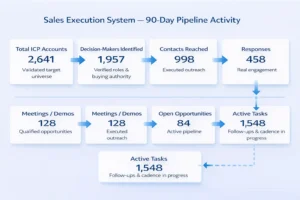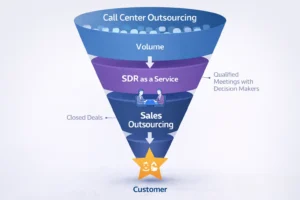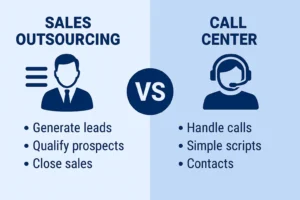When Your Interviewer Is About as Prepared as a Chimp With a Tablet
Because yes, sometimes the real problem isn’t the candidate — it’s the company sitting across the table. And often, that company shouldn’t even be hiring for that role in-house in the first place.

Hiring in Spain? Read this first.
If you're growing your business in Spain — or working with local partners — take a closer look at who's handling your recruitment.
Many interview processes here are still surprisingly informal. Vague roles, outdated job descriptions, chaotic conversations. The result? Good talent walks away — and you never even know why.
It gets even worse when you're trying to hire for commercial roles: sales reps, account managers, customer service, marketing or SEO. These positions are directly linked to revenue, yet the process is often improvised. In many cases, it would be smarter to stop hiring them in-house and work with a specialised outsourcing partner instead.
The 45-minute waste
Have you ever walked out of an interview thinking: “That was a complete waste of time”?
You showed up on time, prepared, dressed sharp. And the interviewer? They had no idea why you were there. They didn’t know the role, the structure, or the expectations. They asked nothing. Or worse — they asked you to explain the company back to them.
Bonus: the job post required fluent English… which they clearly didn’t speak themselves.
When this happens in roles like Sales, Customer Service or SEO, the message is clear: the company doesn’t really know what it needs — yet it is trying to build a full-time team around it.
The company is wasting time
Yes, some interviews are awkward. But what’s worse is when it’s the company wasting the candidate’s time — not the other way around.
Every unfocused interview, every vague role, every “we’ll see internally and get back to you” is a signal of disorganisation. And if you’re doing this for commercial roles, you’re not just losing candidates — you’re losing months of sales execution.
Are you doing the same?
If you're not treating interviews as strategic business decisions, you're not just wasting time — you're burning through potential. And your reputation is going with it.
If you don’t have an HR team, that’s fine. But that doesn’t mean you can wing it. Either learn how to do it well — or get help.
And before you even post the next vacancy, ask yourself a simple question: “Do I really need this role in-house, or could I outsource it to specialists who already have the structure, tools and leadership?” For many companies, especially SMEs, building internal teams for outsourced sales, call center and customer service, or SEO and digital visibility is simply not the best use of time or budget.
Checklist before your next interview
-
✅ Decide if the role should even be in-house:
- Is this a core strategic position, or could it be handled by a specialised outsourcing partner?
- Would you be faster and more efficient by partnering with an external commercial outsourcing team instead of hiring from scratch?
-
✅ Prepare like a real candidate:
- Know the responsibilities, KPIs and reporting lines.
- Understand your company’s product, goals and culture.
- Define clearly what kind of mindset and skills you need.
-
✅ Don’t fake English tests:
- If your level is low — admit it.
- Use a written test or bring someone qualified to assess.
-
✅ Be honest about what you offer:
- If pay is average, offer growth and clarity.
- Don’t oversell. Don’t promise what you can’t deliver.
-
✅ Make it a dialogue, not a monologue:
- Don’t repeat the CV. Go deeper.
- Ask better questions. Actually listen.
What happens when talent walks away?
You send the offer. They thank you politely — and say no. Why?
Because your process raised every red flag. And they went with the company that showed up ready.
Meanwhile, your pipeline, your campaigns and your customers are still waiting. That lost month of recruiting could have been a month of outsourced sales activity, customer support or SEO work already in progress.
Worse: when they accept, then leave
If they don’t reject you at the start, they’ll quit soon after. And that’s more painful. Here’s what they find:
- No structure
- No leadership
- No vision
- Toxic environment
- Empty promises
They quit. You restart. Your team notices. Morale drops. And you wonder why no one stays.
All that time, you could have had a stable outsourced team already operating with clear processes, KPIs and leadership — instead of rebuilding the same position for the third time.
Empty slogans ≠ culture
“We don’t tolerate lateness.” “If you drop your pen at 5:30, this isn’t the place for you.”
These aren't values — they’re red flags. Especially when you're not talking about goals, performance, or growth.
A healthy culture is not about fear of leaving at 5:31. It is about clarity, ownership and results — the same principles that guide any serious outsourced sales operation or customer service team.
The real cost of poor interviews
- Good people walk away silently.
- You look chaotic.
- Reputation tanks — word travels fast (faster than your CRM).
- Your employer brand suffers.
- You’re badmouthed by people who never even worked for you.
And behind all that, there is an invisible cost: broken campaigns, paused sales initiatives, unhappy customers and months where nothing truly moves forward. The opportunity cost is far higher than the salary you were trying to “save”.
Final thoughts
A bad interview isn’t harmless. It’s a mirror of how your company works.
If you’re not sure what to look for, how to assess it, or how to communicate it — maybe don’t run the interview yourself.
And before posting the next vacancy for a commercial role, ask an honest question: “Do we really need to build this internally, or should we partner with a specialised outsourcing team that already has the structure and experience?”
For many growing companies, the smart move is to keep a lean core team and externalise key components such as sales outsourcing, call center outsourcing and SEO visibility.
“An interview isn’t a trap — it’s a potential alliance. Prepare like you’re hiring your next partner. If you don’t inspire, you lose. If you don’t listen, you fail. And if you improvise… don’t expect top talent to stick around. And if you’re tired of improvising, stop hiring for roles you could outsource to professionals who live and breathe this every day.”
Most companies struggle in interviews for a simple reason: they are trying to build internal processes they don’t have the structure or time to maintain. In reality, you don’t need to run chaotic hiring rounds or guess who is the right fit. When you outsource your core commercial functions — sales, prospecting, lead qualification, customer support — you remove the need for endless interviews, misaligned hires and internal confusion. This is exactly why many SMEs in Europe partner with Outsourcing Planet: to get senior-level execution without hiring internally, without risk and without wasting months trying to fix their talent processes.
Ready to stop losing talent (and momentum)?
At Outsourcing Planet, we help growing companies in Spain and Europe avoid exactly this trap. Instead of running endless interviews for sales, support or marketing roles you’re not ready to manage, you can plug into a ready-made, professional structure:
- 🔹 Sales Outsourcing — outsourced SDRs, BDRs and closers focused on pipeline and revenue.
- 🔹 Call Center Outsourcing — customer service, lead qualification and support with clear SLAs.
- 🔹 SEO & Web Positioning — so your brand is visible while your team focuses on operations.
- 🔹 Full Outsourcing Ecosystem — sales, marketing and operations aligned under one strategy.
You don’t have to keep repeating the same interview mistakes. 📩 Book a free consultation with Outsourcing Planet and explore how to externalise the commercial core of your company with a partner that lives in the middle of sales, call center operations and SEO-driven growth.
Did you find this article helpful?
Share it with your team or professional network:










